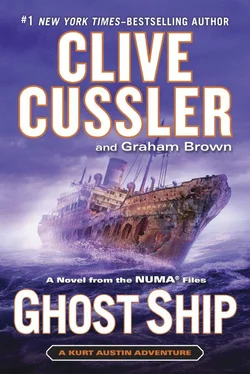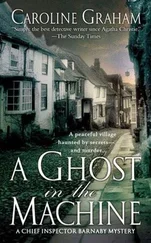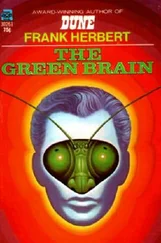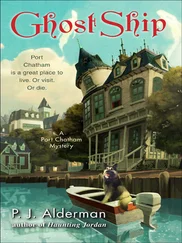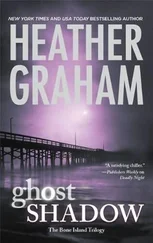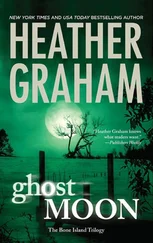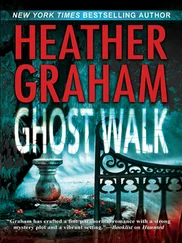Clive Cussler, Graham Brown
Ghost Ship
July 25, 1909
Durban, South Africa
They were driving into a void, or so it seemed to Chief Inspector Robert Swan of the Durban Police Department.
On a moonless night, beneath a sky as dark as India ink, Swan rode shotgun in the cab of a motortruck as it rumbled down a dusty track in the countryside north of Durban. The headlights of the big Packard cast yellow beams of light that flickered and bounced and did little to brighten the path ahead. As he stared into the gloom, Swan could see no more than forty yards of the rutted path at any one time.
“How far to this farmhouse?” he asked, turning toward a thin, wiry man named Morris, who was wedged in next to the driver.
Morris checked his watch, leaned toward the driver, and checked the odometer of the truck. After some mental calculations, he glanced down at the map he held. “We should be there soon, Inspector. No more than ten minutes to go, I’d say.”
The chief inspector nodded and grabbed the doorsill as the bumpy ride continued. The Packard was known as a Three Ton, the latest from America and one of the first motor vehicles to be owned by the Durban Police Department. It had come off the boat with the customized cab and windshield. Enterprising workmen from the newly formed motor pool had built a frame to cover the flat bed and stretched canvas over it, though no one had done anything to make it more comfortable.
As the truck bounced and lurched over the rutted buggy trail, Swan decided he would rather be on horseback. But what the big rig lost in comfort it made up for in hauling power. In addition to Swan, Morris, and the driver, eight constables rode in back.
Swan leaned on the doorsill and turned to look behind him. Four sets of headlights followed. Three cars and another Packard. All told, Swan had nearly a quarter of the Durban police force riding with him.
“Are you sure we need all these men?” Morris asked.
Perhaps it was a bit much, Swan thought. Then again, the criminals they were after — a group known in the papers as the Klaar River Gang — had numbers of their own. Rumors put them between thirty and forty, depending on whom one believed.
Though they’d begun as common highwaymen, robbing others and extorting those who tried to make an honest living doing business out in the Veld, they’d grown more cunning and violent in the last six months. Farmhouses of those who refused to pay protection money were being burned to the ground. Miners and travelers were disappearing without a trace. The truth came to light when several of the gang were captured trying to rob a bank. They were brought back to Durban for interrogation only to be rescued in a brazen attack that left three policemen dead and four others wounded.
It was a line that Swan would not allow them to cross. “I’m not interested in a fair fight,” he explained. “Need I remind you what happened two days ago?”
Morris shook his head, and Swan rapped his hand on the partition that separated the cab from the back of the truck. A panel slid open and the face of a burly man appeared, all but filling the window.
“Are the men ready?” Swan asked.
“We’re ready, Inspector.”
“Good,” Swan said. “Remember, no prisoners tonight.” The man nodded his understanding, but the words caused Morris to offer a sideways glance.
“You have a problem?” Swan barked.
“No, sir,” Morris said, looking back at his map. “It’s just that… we’re almost there. Just over this hill.”
Swan turned his attention forward once again and took a deep breath, readying himself. Almost immediately he caught the scent of smoke. It was distinct in flavor, like a bonfire.
The Packard crested the hill moments later, and the coalblack night was cleaved in two by a frenzied orange blaze on the field down below them. The farmhouse was burning from one side to the other, whirls of fire curling around it and reaching toward the heavens.
“Bloody hell,” Swan cursed.
The vehicles raced down the hill and spread out. The men poured forth and took up positions surrounding the house. No one hit them. No one fired.
Morris led a squad closer. They approached from upwind and darted into the last section of the barn that wasn’t ablaze. Several horses were rescued, but the only gang members they found were already dead. Some of them half burned, others merely shot and left to die.
There was no hope of fighting the fire. The ancient wood and the oil-based paint crackled and burned like petrol. It put out such heat that Swan’s men were soon forced to back off or be broiled alive.
“What happened?” Swan demanded of his lieutenant. “Looks like they had it out among themselves,” Morris said. Swan considered that. Before the arrests in Durban, rumors had been swirling that suggested the gang was fraying at the seams. “How many dead?”
“We’ve found five. Some of the boys think they saw two more inside, but they couldn’t reach ’em.”
At that moment gunfire rang out.
Swan and Morris dove behind the Packard for cover. From sheltered positions, some of the officers began to shoot back, loosing stray rounds into the inferno.
The shooting continued, oddly timed and staccato, though Swan saw no sign of bullets hitting nearby.
“Hold your fire!” he shouted. “But keep your heads down.”
“But they’re shooting at us,” one of the men shouted.
Swan shook his head even as the pop-pop of the gunfire continued. “It’s just ammunition going off in the blaze.”
The order was passed around, shouted from one man to the next. Despite his own directive, Swan stood up, peering over the hood of the truck.
By now the inferno had enveloped the entire farmhouse. The remaining beams looked like the bones of a giant resting on some Nordic funeral pyre. The flames curled around and through them, burning with a strange intensity, bright white and orange with occasional flashes of green and blue. It looked like hell itself had risen up and consumed the gang and their hideout from within.
As Swan watched, a massive explosion went off deep inside the structure, blowing the place into a fiery scrap. Swan was thrown back by the force of the blast, landing hard on his back, as chunks of debris rattled against the sides of the Packard.
Moments after the explosion, burning confetti began falling, as little scraps of paper fluttered down by the thousands, leaving trails of smoke and ash against the black sky. As the fragments kissed the ground, they began to set fires in the dry grass.
Seeing this, Swan’s men went into action without delay, tamping out the embers to prevent a brushfire from surrounding them.
Swan noticed several fragments landing nearby. He rolled over and stretched for one of them, patting it out with his hand. To his surprise, he saw numbers, letters, and the stern face of King George staring back at him.
“Tenners,” Morris said excitedly. “Ten-pound notes. Thousands of them.”
As the realization spread through the men, they redoubled their efforts, running around and gathering up the charred scraps with a giddy enthusiasm they rarely showed for collecting evidence. Some of the notes were bundled and not too badly burned. Others were like leaves in the fireplace, curled and blackened beyond recognition.
“Gives a whole new meaning to the term blowing the loot ,” Morris said.
Swan chuckled, but he wasn’t really listening, his thoughts were elsewhere; studying the fire, counting the bodies, working the case as an inspector’s mind should.
Something was not right, not right at all.
Читать дальше
